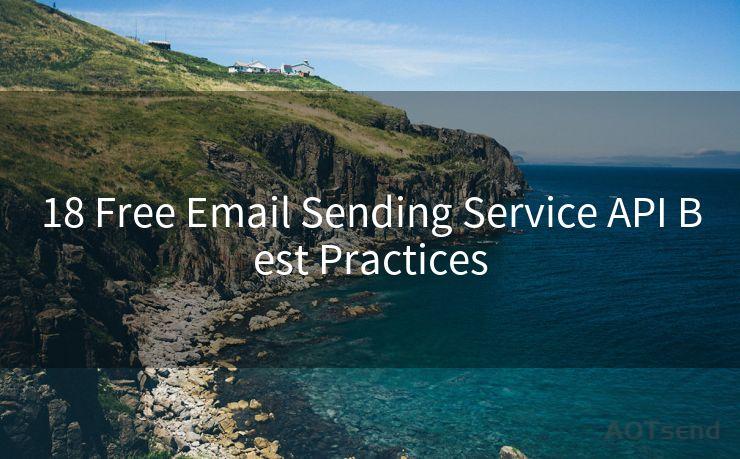18 Free Email Sending Service API Best Practices




When it comes to integrating email functionality into your applications or services, utilizing a free email sending service API can be a cost-effective and efficient solution. However, to ensure optimal performance and avoid common pitfalls, it's essential to follow best practices. Here are 18 best practices to guide you when using a free email sending service API.
1. Understand the API Limits
Before integrating any email sending service, it's crucial to understand the API's limitations. These may include daily sending limits, attachment size restrictions, and the number of recipients allowed per email. Staying within these limits helps avoid service interruptions or penalties.
2. Maintain a Clean Email List
Regularly clean and update your email list to remove invalid or bounced email addresses. This helps maintain a healthy sender reputation and improves email deliverability.
3. Follow Email Best Practices
Adhere to email marketing best practices, such as using a clear and compelling subject line, providing an unsubscribe option, and maintaining a balanced text-to-image ratio in your email content.
4. Optimize for Mobile Devices
Ensure your emails are mobile-friendly, as a significant portion of email users access their inboxes via mobile devices. Use responsive email templates for optimal display on various screen sizes.
5. Monitor Delivery Rates
Regularly monitor your email delivery rates to identify any issues that may affect the reach and effectiveness of your campaigns. Utilize the API's delivery reports or webhooks to stay informed.
6. Personalize Your Emails
Personalization can significantly improve email engagement. Use the data you have about your recipients to tailor your messages and make them more relevant.
7. Test Before Sending
Always send test emails to yourself or a colleague before sending out a mass email. This helps identify any formatting issues, broken links, or other problems that could affect your email's performance.
8. Handle Bounces and Complaints
Set up appropriate mechanisms to handle bounced emails and complaints from recipients. This includes removing hard bounces from your email list and addressing any legitimate complaints promptly.
9. Use Double Opt-In
Implement a double opt-in process for new subscribers to ensure that they have explicitly consented to receive emails from you. This helps reduce spam complaints and improves email deliverability.
10. Protect Your API Keys
Keep your API keys secure and don't expose them in public repositories or client-side code. Consider using environment variables or secure storage solutions to manage your credentials safely.
11. Monitor API Usage
Regularly monitor your API usage to ensure you're not exceeding the free tier limits or incurring unexpected costs. Most email sending service APIs provide detailed usage reports to help you track your consumption.
12. Use Appropriate Headers
Include relevant email headers, such as "From," "Reply-To," and "Return-Path," to ensure proper email handling and deliverability.
13. Avoid Spam Triggers
Be cautious of common spam triggers, such as excessive use of capital letters, exclamation marks, or promotional language. Use a spam checker tool to assess your email's spam score before sending.
14. Handle Unsubscribes Gracefully

Provide a clear and easy way for recipients to unsubscribe from your emails. Respect their choice and remove them from your email list promptly.
15. Validate Email Addresses
Implement email address validation to reduce the chances of sending emails to invalid or non-existent addresses. This can be done using regular expressions or third-party validation services.
16. Utilize Transactional Emails
For critical communications like password resets or account confirmations, use transactional emails. These emails typically have higher deliverability rates and are less likely to be marked as spam.
17. A/B Test Your Emails
Conduct A/B tests to determine the most effective subject lines, content, or send times for your emails. This helps optimize your email campaigns for better engagement and conversions.
18. Stay Updated on API Changes
Keep yourself informed about any updates or changes to the email sending service API. Subscribe to their newsletters, follow their social media accounts, or check their official documentation regularly.
By following these best practices, you can maximize the effectiveness of your email campaigns while minimizing potential issues when using a free email sending service API.
🔔🔔🔔
【AOTsend Email API】:AOTsend is a Managed Email Service for sending transactional emails. Support Email Types: reminders, authentication, confirmations, notifications, verification codes, invoices, password resets, account activations, billing statements, two-factor authentication (2FA), and one-time passwords (OTP) emails, etc. $0.28 per 1000 Emails. 99% Delivery, 98% Inbox Rate.
You might be interested in:
Why did we start the AOTsend project, Brand Story?
What is a Managed Email API, How it Works?
Best 25+ Email Marketing Platforms (Authority,Keywords&Traffic Comparison)
Best 24+ Email Marketing Service (Price, Pros&Cons Comparison)
Email APIs vs SMTP: How they Works, Any Difference?




Scan the QR code to access on your mobile device.
Copyright notice: This article is published by AotSend. Reproduction requires attribution.
Article Link:https://www.mailwot.com/p5709.html



